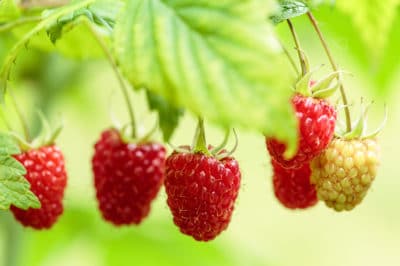Summer-bearing Raspberries
Much patience is required when growing summer-bearing raspberries because the harvest is delayed until the second summer of growth. In the year of waiting, bare-root canes produce more canes from underground lateral stems and buds. The canes will produce leaves, overwinter, and bear fruit the following summer.
Summer-bearing raspberries produce one crop of fruit on the canes that overwinter. The picking season only lasts about 4-5 weeks. To get the full 5 weeks of harvest, more than one type of summer-bearing raspberry should be grown. Summer-bearing raspberries can be subdivided into early season, mid season, late season, etc. Choose varieties from different subtypes. Here are some varieties:
- Encore (late, mid-season)
- Mac Black (late, mid-season)
- Prelude (early season)
- Boyne (early season)
- Killarney (early, mid-season)
- TulaMagic (early, mid-season)
- Bristol (mid-season)
- Royalty (late-season)
- Jewel (mid-season)
- Latham (mid-season)
- Nova (mid-season)
The list above is just a sampling of the different varieties available. With smart planning, maximum harvest time can be achieved. Prepare to start picking raspberries in June in the warmer climates and July in the cooler climates.
Everbearing Raspberries
Unlike summer-bearing raspberries, everbearing raspberries will produce some fruit in its first season. A small amount of fruit will grow on the tips of the first year primocanes. The following summer everbearing raspberries produce a bountiful crop starting in August. This type of raspberry usually produces fruit until the first frost.
Everbearing varieties are capable of producing two crops every season. In late summer or early fall, the tips of the canes that grow throughout summer will produce the largest crop. A second crop in the late fall is possible if the bush is pruned like summer-bearing raspberries.
For the best harvests, choose everbearing varieties that are suited for your USDA Zone. Here are some everbearing varieties to choose from:
- Anne
- BP-1
- Caroline
- Double Gold
- Heritage
- Himbo Top
- Joan J
- Josephine
- Niwot
- Polana
- Polka
Typical Yield Per Season
Twenty feet garden hedgerows typically produce 50-70 pounds of summer-bearing red raspberries, 30-40 pounds of everbearing raspberries, and 15-25 pounds of black raspberries. Yields will vary depending on weather, plant care, and picking techniques.
